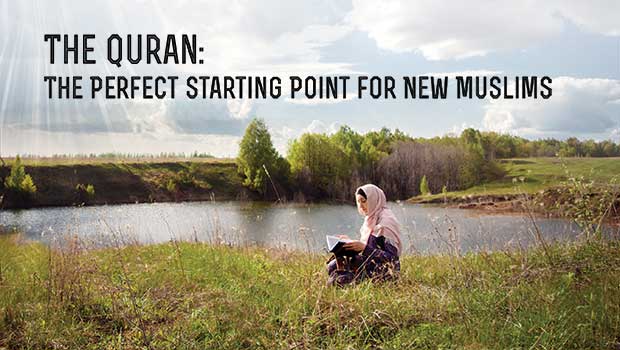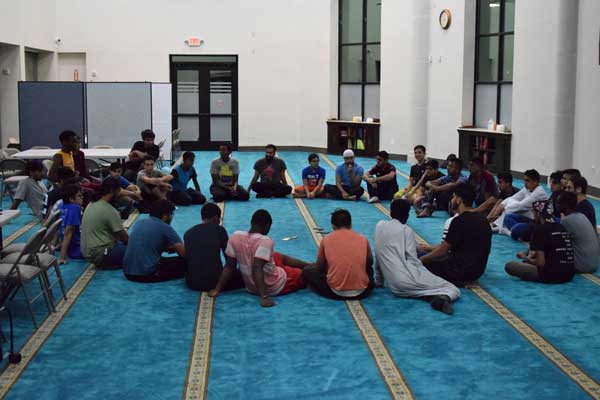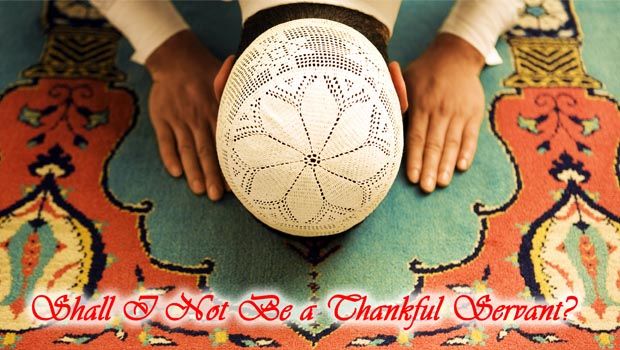I’ve been a Muslim for ten years, alhamdulillah. I guess in the grander scheme of life, ten years is just a blip on the timeline. But as I reflect on all that’s happened over those years, I realize that, like many converts, my time as a Muslim has been filled with right turns and wrong turns, times of high iman and low iman, and plenty of stumbling around until I landed somewhere in between. I say alhamdulillah for it all. But if one were to ask me to pick something, to pick just one thing, that maybe (and Allah knows best!) I could have done better or started sooner, my answer would be to read and study the Quran.
Too often, I meet recent converts who remind me of me. We hear about Islam from a friend, or a friend of a friend, and we start asking questions. Those questions lead us to a masjid where someone gives us a summary of the basics, a few pamphlets, and a Quran in teeny tiny print. Masha’Allah, by the mercy of Allah, we eventually declare our shahada. And for a few minutes, it’s a really exciting time. Takbeers ring out, the community showers us with hugs, and we spend our first moments as a Muslim feeling refreshed and hopeful about our new life path. But when the smiles fade and the congratulations stop, we go back home to find that our lives are exactly the same. Alhamdulillah, we are Muslim now, but the lives we live are not yet very Islamic. For many of us, this is where the hardships of a convert begin.
Backlash
The backlash we receive from non-Muslim friends and family for converting takes a huge spiritual toll. Because we are so new to the deen, we often lack both the religious knowledge to properly present and explain our beliefs and the spiritual maturity to deal with disagreements in a peaceful way. This creates tension and distance from the ones we love, the ones whom we would usually look to for support. Integrating ourselves into existing Muslim communities isn’t much easier. Cultural/ethnic ties and a general lack of empathy can make us feel looked down upon and unwelcomed. This creates more tension and becomes a primary factor for many converts not wanting to participate in masjid activities.
Life becomes a blur when you are trying to navigate a storm of sensitive relationships and learn the rituals of a new way of life all on your own. Because of these difficulties, some converts leave the religion entirely. But many of us simply withdraw and quietly try to hold on to and put into practice whatever basic knowledge we have, in the best way we know how. The refreshed and hopeful feeling subsides and our spiritual development comes to a stand-still.
The Benefits of Reading and Studying the Quran
This is where I believe that reading and studying the Quran, and starting this early on, can be of great benefit to converts, as it can be to every Muslim. Unfortunately, it’s not something we pick up on right away. Often, learning the Quran doesn’t become a priority in our lives until years down the road, if at all. This is a great mistake. The Quran is not just another book for collecting dust on our shelves. It’s the preserved revelations of Allah, the Most High, and its message is meant for you and me. Allah says in the Surah An-Nahl, “… And We have sent down to you the Book as an exposition of everything, a guidance, a mercy, and glad tidings for those who have submitted themselves [to Allah]” (16:89).
Through the Quran, Allah tells us everything that we need to know in order to live a good life. He (SWT) says in Surah Al-Isra, “Indeed, this Quran guides to that which is most suitable and gives good tidings to the believers who do righteous deeds that they will have a great reward” (17:9). Any issue that we can come up with, any problem we might face, any confusion we may have over a matter, Allah has addressed it for us in the Quran. In Surah Al-Isra, we are told, “And indeed We have fully explained to mankind, in this Quran, every kind of similitude, but most of the people refuse anything but disbelief” (17:89).
The Quran even provides us with stories of people who came before us so that we can learn from their examples and use them as a measure to take account of our own souls. Through these stories, Allah provides us with a kind of blueprint for how to live and function in this world. So when we return to our homes and are met with confrontation, argument, or threat of rejection from the ones we love, we can open the Quran and learn from the account of Prophet Ibrahim (pbuh) speaking kindly and respectfully to his father who refused to believe in Allah alone (Surah Maryam, 19:41-48). And when we face old friends who want to tear us from our new path, we can remember the Companions of the Cave who united upon righteousness and were blessed by Allah for holding firm to their faith (Surah Al-Kahf, 18:9-26).
Learning Supplications from the Quran
If ever Allah tests us with great loss, we can try to embody the beautiful patience of Prophet Yaqub (pbuh) when he lost his son (Surah Yusuf). And when we make mistakes, because we all make mistakes, we can open the Quran and recite any number of powerful prayers for forgiveness that Allah, the Most Merciful, teaches us. We can learn a prayer like the one Prophet Yunus (pbuh) made from the belly of the whale: “La ilaaha il anta, subhanaka inni kuntu mina-thaalimeen”, which means “There is no God but You, glory to You, truly I am of the wrongdoers (Surah Al-Anbiya, 21:87). We can also learn the prayer of Prophet Adam (pbuh) and his wife Hawwa, after giving into temptation from the Shaytan: “Rabbanaa thalamnaa anfusanaa wa illam taghfir lanaa wa tarhamnaa lanakuunanna minal khaasereen,” which means “Our Lord, we have wronged ourselves, and if You do not forgive us and have mercy on us, we will surely be among the losers” (Surah Al-Araf, 7:23).
Following the Guidance in the Quran
The Quran contains so much guidance for us to live by. To not learn it is like keeping ourselves in the darkness when Allah has already shown us the light. But still, we make excuses. We tell ourselves, “I don’t know Arabic. What’s the point of reading something that I can’t understand?” I say, then start with whatever translation works for you. We think: “I’m so busy with everything else; I don’t have the time to learn right now.” I say, then start with just one ayah a day. Sometimes, we feel so weighed down by our hardships or by our shortcomings that we start to think that maybe we can’t change. And to this I say, remember the Sahaba. One of the main reasons many of the early Muslims became who we know them to be is because of the Quran.
The perfect wisdom of Allah, coupled with the outstanding example of Prophet Muhammad (pbuh), liberated them from a life of ignorance, confusion, and susceptibility to lower desires. In practicing Islam, they came to be people of knowledge, understanding, justice, and virtue. And it can do the same for us, insha’Allah. But we have to read the Quran. We have to learn the fundamentals of Islam. We have to let the knowledge sink into our minds and into our hearts and then put into action what we have learned. We have to “practice” Islam. We have to make the Quran a priority in our lives and allow it to be our criterion for how to live in this world. And we have to start today. Prophet Muhammad (pbuh) said, “Indeed this Quran is a rope – one end of it is in the Hand of Allah and the other end is in your hands. So hold firmly to it that you will never go astray and never be destroyed” (sahih narration in the hadith collection of Ibn Hibban).
Ways You Can Help a Convert Read and Study the Quran
1. If you haven’t already been reading and studying the Quran, start learning and include a convert friend in your efforts, whether by going to a class or reading and discussing the Quran together.
2. If you already know how to read Quran in Arabic, offer to teach a convert the basics.
3. If you are a Quran teacher, offer classes for beginners so converts can learn the basic meanings of the Quran, especially for the shorter surahs that are memorized for salah.
4. If you are a scholar, or a student of knowledge, offer a tafsir course so that converts can learn the events behind particular revelations and understand how to implement Quran into their everyday lives.
5. If you are any of the above, make dua to Allah and ask Him to ease the transition and hardships of the converts, to bring them into Islam completely, and to allow you and us to be people of the Quran for His sake. Ameen.
Prophet Muhammad, peace and blessings be upon him, said, “The best of you are those who learn the Quran and teach it” (Sahih Bukhari).





